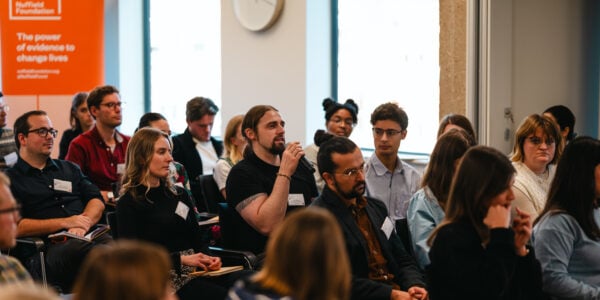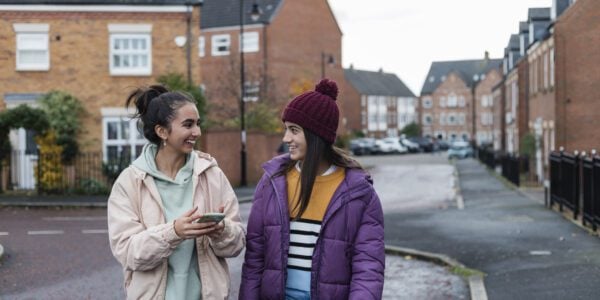The COVID-19 pandemic is now more than a crisis in public health; it may seriously challenge many different aspects of our society.
The Nuffield Foundation’s purpose is to understand and advance social well-being in the domains of Education, Welfare and Justice. Although we do not fund health research, we are interested in the fast-emerging questions relating to the wider social significance of this public health emergency. We are a responsive funder, and we imagine that social scientists and others are already thinking about these dramatic developments in relation to their own research interests. Though the terrain is outside our normal funding remit, we want to listen to our research community and your suggestions of what sorts of research projects could be instigated in the coming weeks to capture the unfolding potential crisis.
Reflections that might frame a response
The Nuffield Foundation team has been reflecting on the many different themes that are dominating both private and public conversations. The virus is already having marked effects on our behaviour. It is simultaneously global, national, local and intimate. It is very rare in the modern, marketised world for a single natural phenomenon to apply so directly and immediately to everyone. We may all feel, in one sense, more equal in a pandemic (as we are in death, though a secularised society seldom thinks openly in such terms). It is also rare for us as a society to have to wait for something to come upon us; we are told we must wait over the coming weeks and months for it to reach its peak. We trust in science and the resilient authority of the state, both as public servant and public arbiter. However, the clarity of the official advice also makes clear there is relatively little we can do to prevent the spread of the virus altogether; it is a matter of how we face it, not when.
How will we best understand the different ways in which we, as individuals and citizens, respond? The current predominant public narrative is that “we are all in it together”. It reminds us we all live in public space for a lot of our time. This dawning awareness for a 21st century culture of what previous centuries would have recognised as the common human condition may have long term effects on our sense of shared identity and belonging; the importance of place, public and private, in our lives may be further underscored as travel is restricted and people are forced to face difficult moments in their homes. In a narrower sense, the common predicament may even in retrospect be seen as instrumental in ‘healing’ the country’s divisions – provoking a new articulation of shared responsibility and generous instinct.
Yet, of course, though we are all affected, we are not affected equally. Older people are at greater risk than the young; at a time of inter-generational tensions, over attitudes, relative wealth and diminished opportunity for younger generations, what effect may a large number of older people dying have on the behaviours of all generations and on feelings of family? What will be the reaction to the likely disproportionate toll on the vulnerable?
The virus may give practical expression to the rhetorical aspiration of ‘solidarity’ – the Director-General of the World Health Organisation has labelled COVID-19 “a test of solidarity – political, financial and scientific”. It may lead to a stronger public consciousness; but at the same time, it may lead to further distancing in the increased use of digital technology for communication without physical contact. We may get used to virtual contact; we may retreat more into the digital world. Do we know how a networked society will react to the actions required of it? The self- consciousness of ‘touch’ as a marker of professional and social contact or affection is already notable. If the majority of people are affected and around 1-2% die, all these manifestations may have a longer-term consequence. Equally, it may just be a moment to remember. Societies are very resilient to disaster and to economic turmoil, but they are changed by them.
What is the scope for original and responsive research?
Social science analysis is invariably conducted in retrospect. In this case, there may be opportunities for research, conducted contemporaneously with the spread of the virus, capturing in real time the experience of the social, cultural and economic effects of such an unexpected and disconcerting phenomenon. These would bring insights that would not be so easily recorded and understood if researched once its peak has passed.
Is there, for instance, scope for a 21st century equivalent to the last century’s Mass Observation approach to reflect the intimate feelings and mood of people in a society under strain? Is there a digital equivalent of a shared diary of experience across generations and across the nation? Would there be value in research, illuminating through its immediacy, which could complement and contribute to the more considered analysis that will follow?
Are there scholars, research groups or institutes which could at speed put in place a practical and ethical way to harvest such material and distil any public policy implications from it? Any such research projects need to start almost immediately. We expect to take risks, but we want those we fund to be clear as to a project’s aims and methods: what is it hoping to do and how is it trying to do it?
We would value your thoughts
These broad reflections take a perspective somewhat outside the Foundation’s usual research funding and our approach at this stage is exploratory. If you have an interest in, and experience of, the sorts of themes outlined above, and believe you can corral the resources necessary to deploy them swiftly, we would like to hear from you.
Submissions are now closed.
There is of course the opportunity to develop more long-term proposals on the implications for social well-being of the COVID-19 public health emergency in our usual funding rounds.
About the author
Prior to joining the Nuffield Foundation in September 2016, Tim was Principal of St Anne’s College at the University of Oxford, a post he held for 12 years. He is also Chairman of the Which? Council.
Tim worked for 25 years in senior broadcasting roles, starting at the BBC where he was editor of Panorama and Newsnight, and later becoming Head of Current Affairs and Weekly News. He was Director of Television and Director of Programmes at Channel 4 from 1998 to 2003. From 2008 to 2015 Tim was a member of the Ofcom Board and was Chair of the Ofcom Content Board.
Tim was also the author of the Department for Culture Media and Sport Review of BBC Digital Radio Services in 2004, a member of Lord Burns’ Advisory Panel on the BBC Charter Review and a Director of SMG plc from 2005-7.

















































